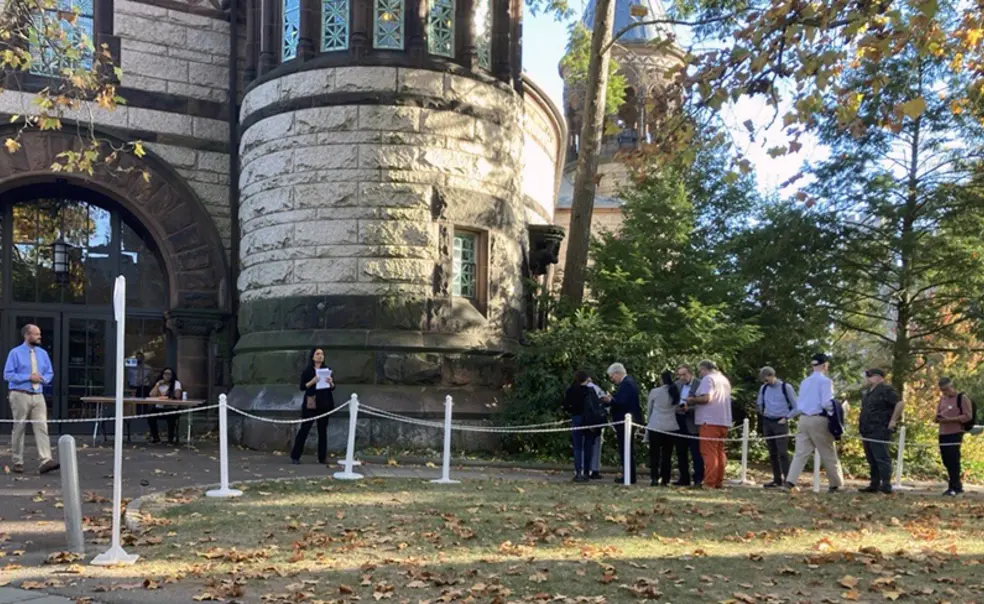Much-Anticipated Faculty Meeting Kicks Controversial Votes to April
One vote would have banned the faculty from voting on political statements; another called for an investigation into the University’s response to last spring’s pro-Palestinian protests
Princeton faculty present at a closed meeting Oct. 21 voted 166-156-7 to postpone votes on three controversial proposals related to faculty advocacy until the last scheduled faculty meeting of the academic year, on April 28, 2025, according to meeting minutes obtained by PAW.
Faculty meetings are typically held in Nassau Hall and are open to the campus press and other observers specified by the faculty’s rules. Two weeks before the meeting, the Faculty Advisory Committee on Policy (FACP), composed of six tenure track faculty members, unanimously voted to close the meeting to observers.
Faculty members had to show identification to enter the meeting, which was moved to Richardson Auditorium in Alexander Hall to accommodate a larger-than-usual showing at the meeting in anticipation of the controversial votes.
The motion to postpone was an addition to the agenda by the FACP a week before the meeting.
The first of the three other proposals on the agenda was proposed by the Council on Academic Freedom (CAF), a group of about 60 faculty members promoting “freedom of inquiry and expression” and “intellectual tolerance,” and was to be presented by politics professor Jonathan Mummolo.
That proposal would have amended the Rules and Procedures of the faculty so that “proposals presented at faculty meetings for a general vote of the faculty must pertain to matters of university governance.”
It would also prohibit the faculty from voting to issue “collective political or ideological statements or on recommendations for other collective political or ideological actions unrelated” to University governance.
“I do not believe postponement was a wise decision,” Mummolo wrote to PAW. “Virtually every peer of Princeton’s has embraced some form of full institutional neutrality. What we were asking for at [the Oct. 21] meeting — that university faculty meetings focus exclusively on university business — was a very modest change by comparison.”
University President Christopher Eisgruber ’83 told The Daily Princetonian last month that Princeton would not consider adopting institutional neutrality.
The other two proposals were to be presented at the meeting by classics professor Dan-el Padilla Peralta ’06 on behalf of more than 20 other faculty members. One called for a committee of faculty to evaluate the University’s response to pro-Palestinian protests last spring, and the other called on the University to establish an “initiative to support and advocate for Palestinian, Arab, and Arab-American students, faculty, and staff.”
According to documents obtained by PAW, a few days prior to the meeting, the University’s General Counsel Ramona Romero circulated a memo about legal concerns regarding those two motions.
After reading the memo, “we realized they [the proposals] would need to be revised,” Padilla Peralta told PAW. Support of postponement was, therefore, “in the interest of making them [the proposals] more solid,” he explained.
Other faculty members were skeptical about this explanation.
“They wanted the postponement to April to pass, which I interpreted as stopping neutrality until at least April,” politics professor John Londregan *88 said.
“The only reason to take these issues up in faculty meetings is to give the impression that Princeton has adopted an ‘official’ position on a matter, or that ‘The Faculty’ as a body hold a certain view. Academic freedom demands that we each retain the right to speak for ourselves,” wrote Mummolo.
Mummolo also emphasized that faculty have other outlets through which to voice their political views, and cautioned that faculty meeting votes cannot accurately represent the opinion of the entire faculty.
Padilla Peralta argued that the postponement created more space for dialogue about why the CAF proposal “lacks vision” and “... about why affirming the right of faculty as a collective to speak on Palestine benefits all faculty, as well as the broader Princeton community.”
In the meantime, there are six months for the faculty to deliberate among themselves and revise their proposals.
“It was better to have more time for our own vision, our own constructive vision,” Padilla Peralta said.












No responses yet